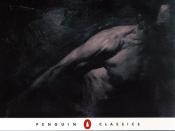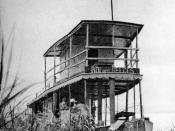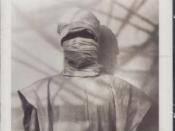"The Horror! The Horror!" Joseph Conrad's "Heart of Darkness" is not just a suspenseful tale of a man's journey to one of the Earth's few remaining frontiers, the African Congo; it is a psychological insight into the true pits of the human mind, in search of the true "heart of darkness", which resides not geographically, but is a part of all of us, living under the restraints of society and civilization.
Conrad explores the idea that under the taboos and societal mandates, there is a potential for actions and beliefs that are shocking to the common individual. Yet, if a man is released to do as he wills, without society to judge him, he can cross into a state-of-being that we consider primal and non-human. Without civilization, one would become an agent free to do whatever he chooses, and will do it willingly.
Conrad demonstrates and hints at this conclusion using several literary devices, ranging from symbolism to the subtle changes in Marlowe, the narrator, that represent his growing distance from civilization and reality.
The strongest device and example of this phenomenon is the transformation of Mr. Kurtz, the director of the Inner Station. In this essay, I will explain and analyze Kurtz's "de-humanity", and how effective it is in achieving Conrad's goal. This "deconstruction" of Kurtz culminates with his utterance of the phrase, "The horror! The horror!", as he lay dying. Yet, first we must explain what Kurtz was before he stepped over the edge.
From the moment Marlowe arrives on the coast of Africa, he hears tales of an incredible man, who runs a trading post deep in the Congo. The accountant at the first station said, "He [Kurtz] is a remarkable person.... Sends in as much ivory as all the others put together...." (Conrad 33-34)...


